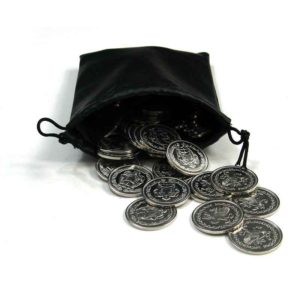 Mrs. Morton was a widow woman who had an only son, named Abel, about seventeen years old. They lived in a small hut, in the outskirts of the village, and were very poor. Abel had never learned a trade, but he was an honest, industrious boy. He loved his mother very much, and was always ready to work for her when he could get any work to do. One winter his mother had been very sick, and, as he had been obliged to stay at home and nurse her, he had not been able to work much, and they were very much in want of clothing, and food, and fuel, and everything.
Mrs. Morton was a widow woman who had an only son, named Abel, about seventeen years old. They lived in a small hut, in the outskirts of the village, and were very poor. Abel had never learned a trade, but he was an honest, industrious boy. He loved his mother very much, and was always ready to work for her when he could get any work to do. One winter his mother had been very sick, and, as he had been obliged to stay at home and nurse her, he had not been able to work much, and they were very much in want of clothing, and food, and fuel, and everything.
One afternoon, Abel went into the village to see if he could get some work, and earn a little money. He went from one house to another all through the village, but could get nothing to do.
Hungry and sorrowful, faint and sick at heart, he turned his steps towards home. He walked slowly on, and was just turning into the lane that led towards his mother’s cottage, when his foot struck against something in the road. He stooped to pick it up, and found it was a small silk purse. It was quite heavy. He shook it, and the clear jingle that it made told him it was filled, not with copper, but with silver.
The poor fellow did not stop to open it, for night was coming on, and he knew his mother would be anxious about him. As soon as he entered the cottage, he drew the purse from his pocket, and threw it on the table near his mother.
“What is that?” she asked, as she heard the rattle of the money.
“A purse, mother. I found it on the road, just at the corner of our lane.”
A candle was lighted. The purse was emptied. It was found to contain twenty silver half dollars.
“Ten dollars,” said Abel. “I wonder if we can find who lost it?”
“Isn’t there some name on the purse?” asked Mrs. Morton.
Abel looked on the inside of the clasp, which was lined with red morocco, and there he saw the name of “John Thompson.”
Mr. Thompson was one of the richest men in that neighborhood. He owned a large farm; kept a great number of cows, and supplied the village and neighborhood with milk and vegetables.
“Ah! How easily Mr. Thompson could spare this!” said Abel. “It wouldn’t be any loss to him, and we need it so much!”
“That’s true,” said his mother; “it wouldn’t be any loss to him; but it would be a great loss to us if we should keep it.”
“How so, mother?”
“Why, don’t you see, we should lose our honesty and honor. That is worse than losing money. The next time you met Mr. Thompson you would be afraid to look him in the face. There would be a blot upon your character, and a thorn in your pillow at night that would disturb your rest. Surely you wouldn’t be willing to keep it, Abel?”
“No, mother; I wouldn’t keep it for anything.”
Bright and early the next morning, Abel hastened over to Mr. Thompson’s house, and gave him the purse.
He seemed pleased to receive it. He asked Abel if he could write and cipher; and, finding he could do both very well, he told him he wanted an honest person who could write and keep accounts, to go to market, and sell things for him.
“I have thought of employing you for some time, Abel, but I wanted first to be sure that you were honest. I took this way of finding it out. I put the purse in the road on purpose, when you were coming home last night. I stood behind the bushes, and saw you pick it up. I tried two other young men in the same way, but they both kept the money, so I couldn’t trust them; but I’m sure I can trust you. And now I’ll give you constant employment, and forty dollars a month as your wages.”
Abel burst into tears. He couldn’t speak. He only pressed Mr. Thompson’s hand. Then he flew home to tell his mother the good news. And when he got through he said, “O mother! Only to think if I had kept the money!”

Leave a Reply